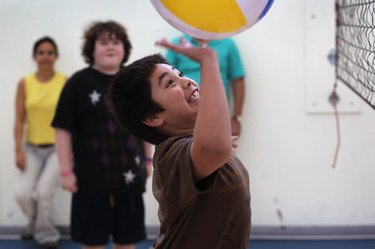
Not just adults are overweight. Teenage obesity is a dangerous problem that can promote serious medical conditions, such as type 2 diabetes. Fortunately, there are a variety of ways to shed excess pounds without counting calories or spending numerous hours in a gym. You can quickly lose weight by changing bad habits -- and creating a few new positive ones.
Exercise for 60 Minutes a Day
Video of the Day
Exercise for at least an hour every day to shed pounds quickly. You can exercise for 60 minutes straight -- or break it up into shorter increments. Any type of physical activity counts such as dancing, jogging, riding a bike to school, shooting baskets at lunch or walking home instead of driving. You can also join a school sport or community program such as gymnastics or ballet. At home, stay active with chores or even interactive video games that are designed to get you physically moving.
Video of the Day
Reduce Portion Sizes
Reduce your meal and snack portion sizes to quickly lose unwanted weight. Restaurants, school lunches and packaged foods are sometimes served in larger portion sizes, making it easy to overeat without even realizing it. Check the suggested serving size on food labels so that you don't end up eating two or more servings. It can take up to 10 minutes before you get the signal from your brain that you are full -- so eat slowly and stop eating when you no longer feel hungry.
Eat Breakfast
Eat breakfast every day. A nutritious breakfast can increase your metabolism, helping you to burn more calories throughout the whole day. Although high-fiber cereals and whole-wheat products are ideal, you can also snack on last night's dinner or on nuts and fruit. Breakfast can also keep you feeling fuller longer, preventing you from overeating at meal times or indulging in unhealthy snacks in between meals.
Don’t Eat While Distracted
Avoid talking on the phone, watching TV, texting or playing video games while you eat. These types of distractions prevent you from hearing your brain's fullness cues. Instead, sit in the cafeteria or at the kitchen table during meals and snack breaks. Eat slowly, savoring every bite so that you feel satisfied even if you have less food on your plate than usual. Use silverware, taking time to cut up your food if possible -- this will help you to focus on your food and make it last longer.